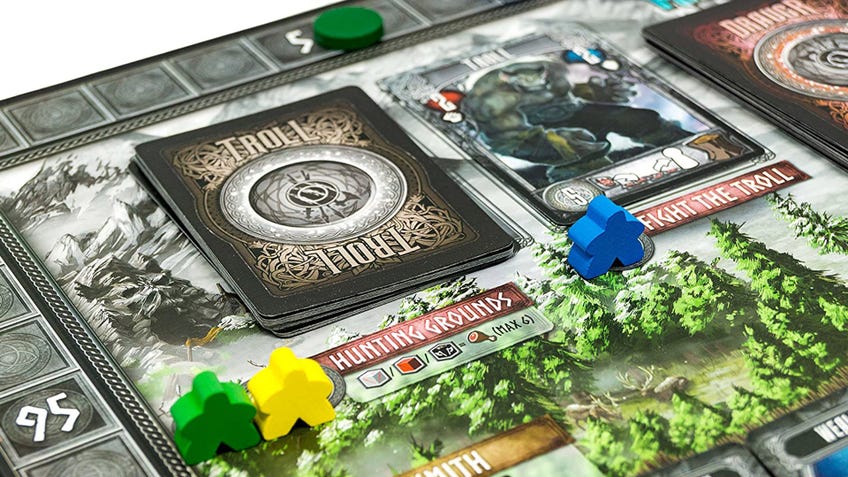10 best worker-placement games
Take your places.
Worker-placement board games offer extremely strategic play experiences, pushing players to devise complex tactics to make the most out of every move. You’ll need to plan ahead to come up with the best ways to earn resources and points while also being nimble enough to change course if another player interferes. Whether you're assembling a team of warriors or just trying to win a some game of sports, placing your little figures all comes to skill, tactical genius and intuition.
Best worker-placement games
- Lords of Waterdeep
- Agricola
- Caylus 1303
- Champions of Midgard
- Viticulture
- Tzolk'in: The Mayan Calendar
- Everdell
- Abomination: The Heir of Frankenstein
- Anachrony
- Raiders of Scythia
Players often need to consider the tradeoffs between investing in making future turns better or just taking actions that up their score. That decision calculus tends to shift as the end of the game nears, with some spaces that were fought over in early turns becoming effectively useless while others dedicated just to scoring become highly coveted. Knowing when to shift your focus can be the key to victory.
1. Lords of Waterdeep
Complete quests while scheming against your enemies
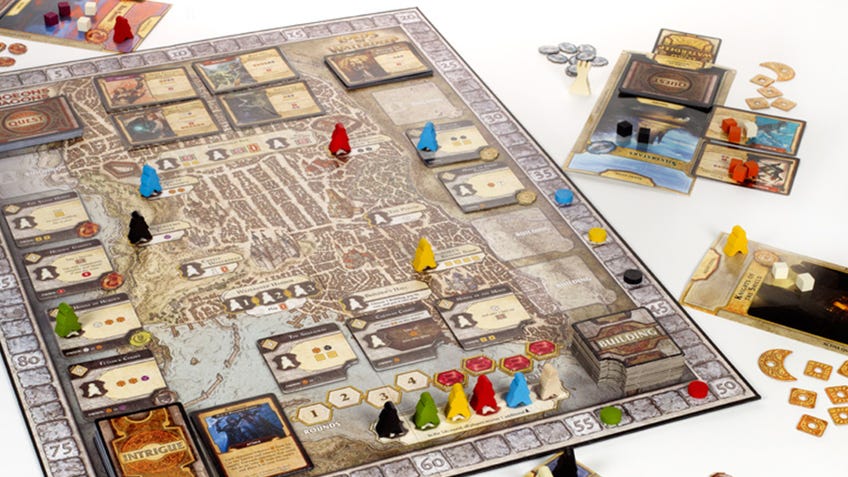
The city state of Waterdeep is one of the most iconic locations in Dungeon & Dragons’ Forgotten Realms setting, a bustling place of commerce that attracts adventurers looking to gear up before raiding the notorious dungeon Undermountain. In this board game set in the city, players take on the role of one of the masked Lords of Waterdeep, each with their own specialty and represented by a card they keep secret until the end of the game.
The theme makes this game particularly easy for RPG players to hop into. The gameplay mechanics are fairly simple and well explained on the game board and cards. Lords deploy their agents to locations around Waterdeep to gather gold, recruit various types of adventurer, and pick up quests to send the heroes on. When you gather an appropriate party, such as the four fighters plus a cleric and wizard needed to repel seawraiths, you’ll complete the quest and earn a designated number of victory points, along with some other reward such as more adventurers, gold or a permanent buff that will let you accumulate more resources or points on future turns.
You can construct buildings that provide better action tiles anyone can use, though the player who owns it will get a cut of the spoils each time. Each lord gets bonus points at the end of the game based on objectives like completing certain types of quest or constructing buildings, so you should watch out for clues to their identity because it will help you predict their future actions. Lords of Waterdeep is one of the more interactive worker-placement games out there, as players get intrigue cards they can use to steal resources or even mess with another player’s momentum by forcing them to go on a specific quest. If you want to play even dirtier, you can add in the Scoundrels of Skullport expansion, which lets players push their plans forward faster at the cost of accumulating corruption.
Buy Lords of Waterdeep on Amazon US and Amazon UK.
2. Agricola
Diversify your crops and upgrade your home
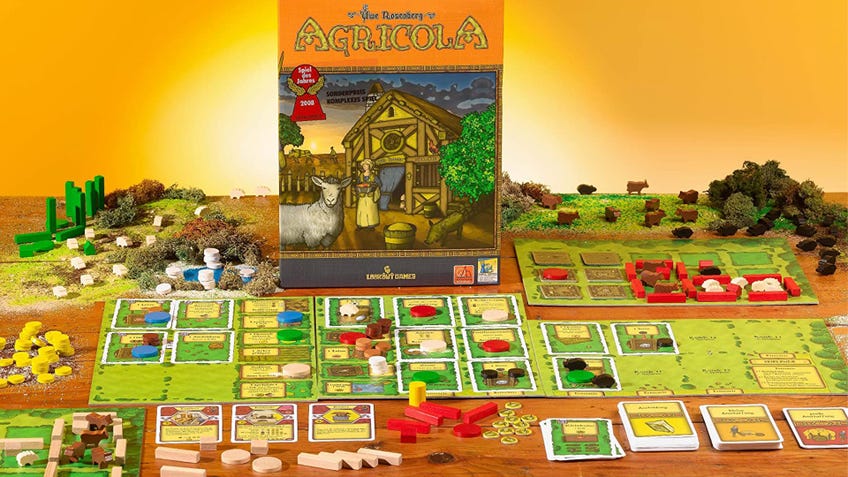
Fans of farming video games such as Harvest Moon and Stardew Valley will find a lot of familiar elements in Agricola, Uwe Rosenberg's classic German board game about running a 17th-century farm. You start with just a humble two-room house and large swathe of unworked land. You’ll improve your homestead by sending your farmers out to plow fields, plant seeds, gather construction materials and build structures.
You’ll need to diversify your actions as much as possible as you’ll lose points at the end of the game for each plot of unused land and for not having at least one of each type of crop and livestock. While many worker-placement games take a ‘more is better’ approach when it comes to increasing your labour force, each worker here represents another family member whom you’ll need to house and feed. Expansion must be done with care. If you have extra food, you can also afford to spend some time studying for an occupation that can make actions more efficient.
Just like actual farming, Agricola is a game that requires planning and patience. If you want to have a bunch of sheep, you’re going to need a big enough pen for not only the ones you have now but the babies they’ll have. You’ll also want to leave room for a pigpen and pumpkin patch, and make sure you spend at least some time improving your farm with gadgets like a loom or butter churn that will let you get the most out of your resources and earn points.
Buy Agricola on Amazon US and Amazon UK.
3. Caylus 1303
Negotiate for control of construction projects
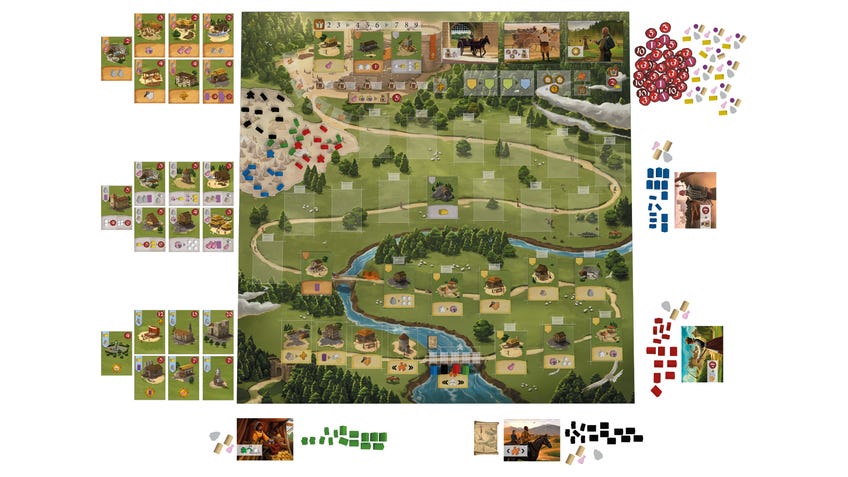
Parks & Recreation lampooned Eurogames with a plot where a particularly nerdy character designed his own version: The Cones of Dunshire. While it was an over-the-top parody of the genre, Cones of Dunshire’s reliance on baroque roles and moving around a board is particularly reminiscent of Caylus, a 15-year-old game that was updated last year as Caylus 1303.
Set in medieval France, the game has players compete to earn prestige by assisting in the construction of a castle. To do this, they’ll need to gather resources, recruit workers and construct buildings, which take the form of tokens on the board that resemble hotels in Monopoly. When another player uses your buildings, you gain prestige points.
There’s much more direct competition between players in Caylus 1303 than in most worker-placement games. Every round, players bid for control over the position of the provost, which determines which workers are actually activated. You can also steal other players’ role cards, which give you special abilities like gaining additional prestige from construction.
When another player runs out of workers or decides they don’t want to take any more moves, they pass and force you to play a surcharge for any future actions you take. That means your efficiency can be reduced if another player has fewer resources than you. The revised rules have shortened the game and added more random elements, but it’s still a complex, highly social experience.
Buy Caylus 1303 on Amazon US and Amazon UK.
4. Champions of Midgard
Earn glory by fulfilling your destiny
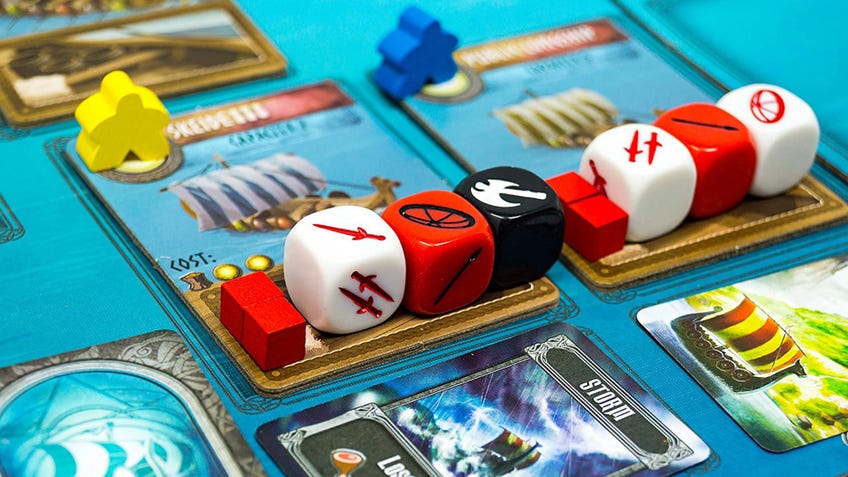
Fast-paced and easy to learn, Champions of Midgard has players take on the role of a Viking leader who must bring glory to their people by fighting trolls, draugr and other mythical monsters. Each monster has their own dice pool and many have restrictions about the type of warrior that can be sent against them. Placing workers in various spots on the board allows you to accumulate dice of specific types, increasing your chance of success. You also need to make sure you have a diverse squad of warriors trained in axes, swords and spears so they’re ready to face any foe that comes up.
While the use of dice inherently make the game more luck-based, there’s still plenty of strategy when it comes to devising turns to keep your people well supplied with food and building materials, and collecting runes that will tip the odds in your favour. The game also features collective action problems where players must decide how many resources to commit to battling a menacing troll, running the risk of taking blame in the form of negative points if the threat isn’t dealt with.
Buy Champions of Midgard on Amazon US and Amazon UK.
5. Viticulture
Patience is key to aging wines and scoring big
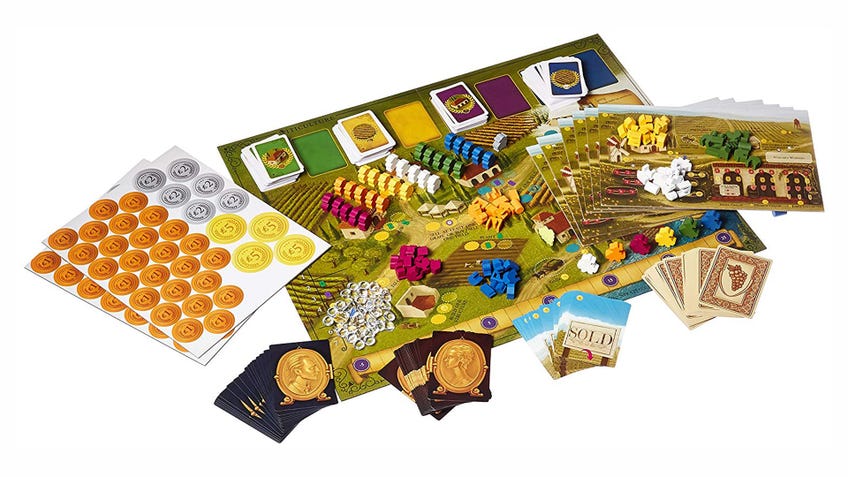
Viticulture may offer the best fusion of flavour and mechanics in the genre. The game almost feels like a management simulation with its highly detailed and realistic portrayal of the challenges of running a small winery.
Players primarily score points by fulfilling wine orders, which requires growing grapes and aging them for several rounds in a wine cellar until they’re ready to sell. You need to constantly be planning ahead to make sure you can meet your production goals by planting a mix of grape varietals, installing an irrigation system and trellis, and expanding your cellar so that you can increase the quality and variety of wines you can make.
Meanwhile, you can also earn points or gain resources through attracting visitors like a wedding party or wine critic. These cards can be hugely powerful when played at the right time, but push you to turn your winery into more of a tourist attraction by building a cottage and offering wine tastings. There are a wide variety of valid paths to victory, but no matter your play style, you’d be well served by having a bottle of wine to share at the table to get everyone in the spirit.
Buy Viticulture on Amazon US and Amazon UK.
6. Tzolk’in: The Mayan Calendar
Timing is everything when it comes to the turning of the seasons
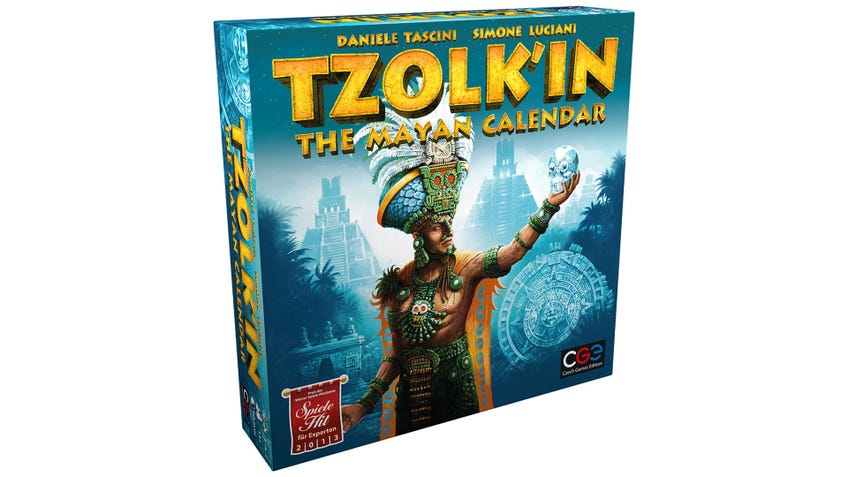
In most worker-placement games, players deploy all of their workers each turn and then get them back at the start of the next round. That’s not the case in Tzolk’in: The Mayan Calendar, where deciding how long to keep workers on the board is a major part of the strategy.
The key gimmick of this game is a set of gears that shift at the end of each round, indicating the slow grinding of time. The longer a worker stays on the gear, the more effective their action will become. You can’t just sit and wait because you must either place or remove some workers each round. The game becomes a delicate balancing act between immediate gratification and patiently waiting for a big payday.
Placing more than one worker in a round forces you to pay increasing amounts of resources to feed them. You’ll also have to feed your workers at certain preset times in the game - if you haven’t sufficiently planned ahead by stockpiling corn or building improvements that reduce their maintenance, you’ll lose points. Add in a wrinkle where opponents can occasionally speed up the turning of the gears and you have a game that truly stretches your ability to think several turns ahead.
Buy Tzolk’in: The Mayan Calendar on Amazon US and Amazon UK.
7. Everdell
Build and populate a city for adorable critters
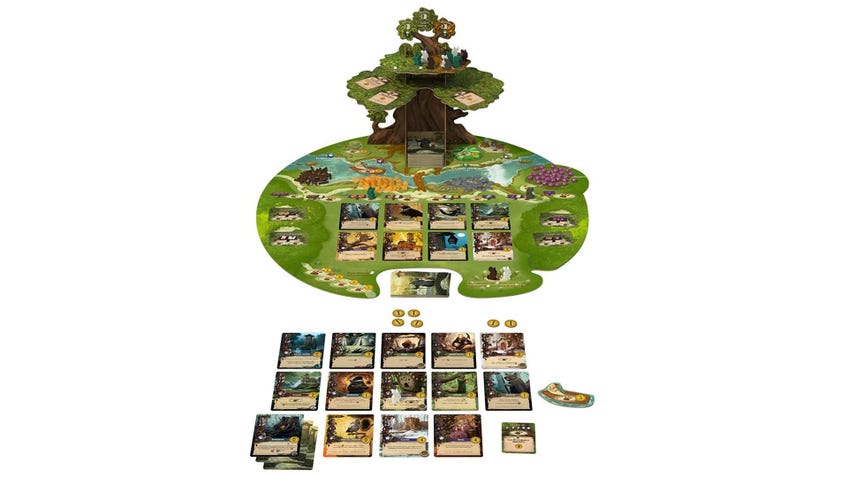
Everdell applies the cute animal aesthetic of Root to a worker-placement game instead of an asymmetrical battle for domination. Players construct a city by picking up cards representing various buildings and critters, each of which has their own special ability that can gain you resources and points.
Every type of building has an associated critter that you’ll be able to pick up for free if it’s available, meaning the timing of your placements are key to efficiency. But the amount of room in your city is also a highly limited resource. Early in the game, it can seem almost unfathomable that you’ll be able to fill it, but as play goes on and it’s easier to afford the price of various cards, the spaces fill up and cheap cards placed early become a burden if you don’t have a way to get rid of them.
The result is that Everdell feels a bit like a drafting game mixed with a worker-placement game. It also looks spectacular with a giant tree centrepiece used to track the phases of the game and display event cards, adorable animal meeples and charming card art. Soaking in the details is a great way to pass some time when your opponents are considering their next move.
Buy Everdell on Amazon US and Amazon UK.
8. Abomination: The Heir of Frankenstein
Master mad science and unlock immortality
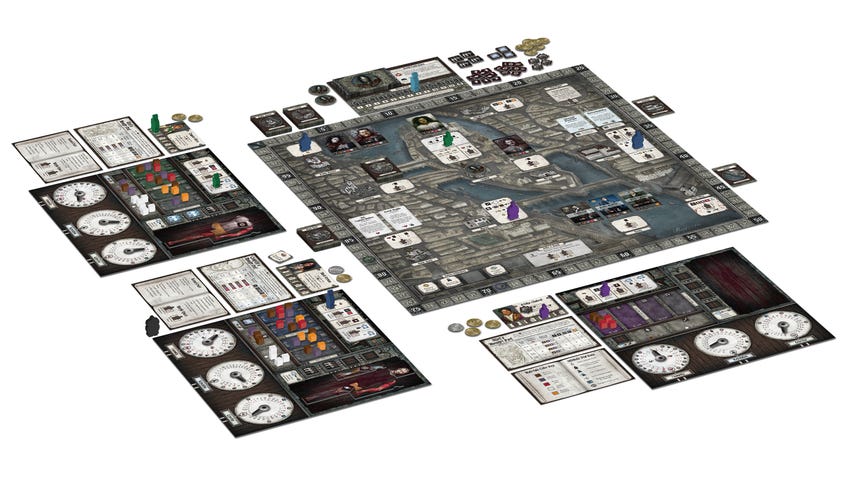
Frankenstein’s monster is lonely and wants someone like him to spend eternity with. You play a scientist racing to make that happen by collecting corpses and conducting research while avoiding becoming known as a mad scientist or a monster yourself.
Abomination is a long and extremely complex game, involving a huge number of tracks to monitor, components to gather, dice odds to calculate and phases to building your monster. It combines aspects of more narrative games such as Arkham Horror with event and encounter cards where players must make decisions that will affect their outcomes. The high level of difficulty and horror means it’s not a game for the faint of heart.
Buy Abomination: The Heir of Frankenstein on Amazon US and Amazon UK.
9. Anachrony
Bring humanity back from the brink of extinction
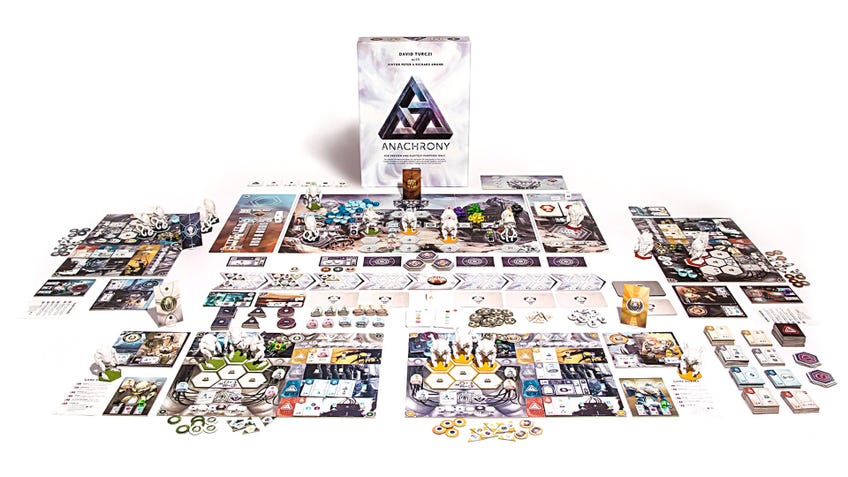
The most high-concept game on this list, Anachrony is set in the 26th century when four groups are fighting to be both the dominant power on Earth while also trying to protect humanity from a coming asteroid impact. Once the impact happens, they’ll have a few turns to try to ramp down their operations in a dying city and evacuate so they can better influence the survivors. It’s a particularly dramatic way of marking the genre’s typical transition from building up your capabilities to focusing on scoring.
Gathering resources is particularly complex. In addition to the typical method of deploying workers to specific squares to mine or purify water, you can equip them with exosuits that allow them to survive harsh conditions, allowing them to use different spaces on the board. You can even use time travel to grab resources from the future, but you’ll eventually have to send the resources back to avoid messing up the timeline.
This is a game science-fiction fans will love, combining the strategies of worker-placement games with some of the flavour of games like Pandemic or XCOM as certain spaces become unavailable in late rounds because of the devastation caused by the asteroid impact. The different path goals and abilities provide a high level of replayability - you’ll want to swap between them to try new playstyles.
Buy Anachrony on Amazon US and Amazon UK.
10. Raiders of Scythia
Build a crew - but don’t get too attached
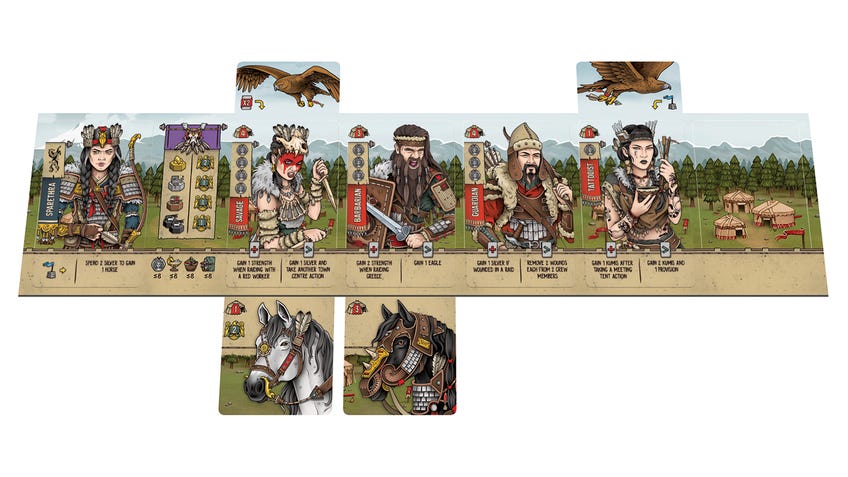
An updated version of Raiders of the North Sea, Raiders of Scythia trades out Vikings for Scythians, the nomadic ancient empire where men and women fought together against Persia and Greece. It just released this summer - which is well-timed given that Charlize Theron recently played a Scythian warrior in Netflix series The Old Guard.
Aside from offering some fascinating history, the gameplay is strong, forcing players to balance the resources needed to deploy their forces far from home and the pressure to be the first to raid a given area and claim its spoils. Players determine how successful their raid is by rolling dice - earning greater rewards for big numbers but risking injury to their crew, making them less effective until they go home to heal. Balancing the benefits of patching up your fighters against letting them die and recruiting new ones with different special abilities is a major part of the game’s strategy.
Fighters can travel with horses and eagles that enhance their power and special abilities. Almost all the cards can be played in different ways depending on whether you want them to stick around or just have an immediate effect. You’ll need to carefully consider which cards to hold back to play as the game progresses and which you should use for a quick edge.
